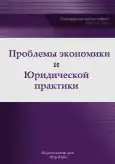Current Problems of Recovery of Aliment in Favor of Minor Children
- Authors: Gorohova K.V.1
-
Affiliations:
- Russian State University of Justice
- Issue: Vol 19, No 2 (2023)
- Pages: 72-75
- Section: Private Law (Civil) Sciences
- URL: https://journal-vniispk.ru/2541-8025/article/view/250191
- ID: 250191
Cite item
Abstract
Formulation of the problem. The article deals with the problems associated with the recovery of alimony for minor children. It is stated that with all the variety of repressive measures used against the non-payer, the problem of collecting alimony remains relevant. Currently, we can say that there are many unresolved issues and gaps in the legislative regulation of the institution of alimony obligations that require prompt development. Target. Conduct a study of the legal regulation of relations for the recovery of alimony, identify current problems in this area and offer recommendations for their resolution. Conclusions. The analysis of existing problems was carried out and measures to overcome them were formulated.It has been established that alimony is a legal institution that allows you to protect the rights of children and disabled family members. It is proposed that in order to eliminate problems, it is necessary to resolve the issue of reducing the amount of responsibility, replacing real imprisonment with alternative punishments provided for by the current legislation.
Full Text
##article.viewOnOriginalSite##About the authors
Khristina V. Gorohova
Russian State University of Justice
Author for correspondence.
Email: gorohova.hristina@mail.ru
post-graduate student
Russian Federation, MoscowReferences
- The Constitution of the Russian Federation was adopted by popular vote on December 12, 1993 (subject to amendments made by the Laws of the Russian Federation on amendments to the Constitution of the Russian Federation of December 30, 2008 No. 6 —FKZ, of December 30, 2008 No. 7 —FKZ, of 05.02.2014 No. 2 —FKZ, dated 07.21.2014 No. 11 —FKZ) // Collection of Legislation of the Russian Federation, 04.08.2014, No. 31, Art. 4398.
- Family Code of the Russian Federation of December 29, 1995 No. 223 —FZ (as amended on May 29, 2019) // Collection of Legislation of the Russian Federation, 01.01.1996, No. 1, Art. 16.
- United Nations Convention on the Rights of the Child. Adopted by the UN General Assembly on November 20, 1989// International law in documents: textbook, Batalova N.T., Melkov G.M., M., 2016.
- Morozova I.B., Alimony obligations of parents in relation to minor children // Legislation. —2007, No. 1.
- Rzhanicyna L.S. Sphere of social insecurity. The problem of improving the provision of children with alimony / L.S. Rdanitsyna, T.A. Gurko, M., 2007.
- Erohina E.V. European family law: textbook / E.V. Erokhin. Orenburg state. un-t. —Orenburg: LLC IPK «Universitet», 2016
- Kistanova E. V. Everything about the recovery of alimony for minor children. Practical guide / Moscow, 2019.
- Kovyljaeva A. I. Collection of alimony for minor children with a high income of a parent liable to alimony under the laws of Russia, Germany and Great Britain. In the collection: Young Researcher: Challenges and Prospects. Collection of articles based on the materials of the CXXI international scientific and practical conference. Moscow, 2019, pp. 133–136.
- Kotljarova V.S., Lobzova K. Ju. The problem of recovery of alimony for minor children. In the collection: Problems of state-legal construction in modern Russia: analysis, trends, prospects. Collection of materials of the IV International scientific and practical conference dedicated to the 55th anniversary of SWSU. 2019, pp. 168–171.
- Elfimova Ju. S. Problems of legal regulation of relations for the recovery and payment of alimony // Problems of modern science and education. 2015. No. 10 (40). pp. 129–137.
- Koledina M. V. The current state and some problems of collecting alimony for the maintenance of minor children // Legal state: theory and practice. 2016. No. 1 (43). pp. 107–111.
- Gladilina A. S., Balashov A. A. On the relationship between the concepts of «alimentary obligations» and «alimentary legal relations» // Russian Science and Education: Problems and Prospects.2015. No. 2. P. 72–73.
- Knyazev A. V. Collection of alimony in court // Lawyer.1999. No. 12.
Supplementary files








